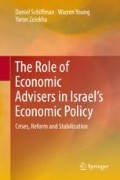Abstract
In early 1950, the left-leaning Israeli government came under attack from opposition parties that denounced its quasi-socialist economic policies. They advocated the abolition of exchange and price controls, along with the introduction of a floating exchange rate. In response, the government turned to the well-known economist, Kalecki, who, in a September 1950 report, recommended not only the retention of exchange controls but of price controls. His advice was at first implemented, although it seems that he was initially approached to strengthen the image of policy decisions that had already been made. Later on, in a politically inspired economic reform, the government distanced itself from his recommendations. By April 1952, Israel’s financial position had deteriorated, due to a short-term foreign currency debt crisis. The US government decided to send an economic expert, Mikesell, to Israel. His main recommendation was the immediate implementation of a detailed and comprehensive foreign exchange budget, albeit over the initial objections of the then Israeli finance minister. This was eventually put into place, enabling continued US support of Israel’s “New Economic Policy,” which distanced the economy from the earlier quasi-socialist policies advocated by Kalecki and the Israeli government itself.
Notes
- 1.
At the time, Kalecki was working at the UN, on leave from his position at the Oxford Institute of Economics and Statistics.
- 2.
As we shall see below, Gass was later appointed by Ben-Gurion to head the Economic Advisory Staff (1953–1955), comprised of a number of foreign economic advisers, including Abba Lerner.
- 3.
Mapai lost one Knesset seat, but its Arab satellite party gained three.
- 4.
The choice of the Soviet-sounding name “New Economic Policy” was rather ironic.
- 5.
For a detailed analysis of the import liberalization, see Michaely (1975, 27–57).
- 6.
Mapai economists justified the NEP on the basis of the new possibilities created by the (expected) reparations agreement with West Germany (by January 1952, both the Bundestag and the Knesset had empowered their respective governments to begin official negotiations), but the election results clearly played a role (Etzioni 1959).
- 7.
The composition of Moshe Sharett’s fifth government (January 1954–June 1955) was virtually identical.
- 8.
The Economic Advisory Staff (EAS) operated from May 1953 to July 1955. Its senior staff was comprised of five US economists, including Abba Lerner, who is the subject of Chap. 3.
References
Acheson, D. (1952). Doc. 446, Secretary’s Memoranda, FRUS, 1952–54, IX, 1.
Barkai, H., & Liviatan, N. (2007). The Bank of Israel, Selected topics in Israel’s monetary policy (Vol. 2). Oxford: Oxford University Press.
Bruce, D. (1952). Doc. 453, FRUS, 1952–54, IX, 1.
Bullock, A. (1985). Ernest Bevin, Foreign Secretary. Oxford: Oxford University Press.
Davis, M. (1953). Doc. 582, FRUS, 1952–54, IX, 1.
Dulles, J. (1953). Doc. 628, FRUS 1952–54, IX, 1.
Eban, A. (1952). Doc. 469, FRUS, 1952–54, IX, 1.
Etzioni, A. (1959). Alternative ways to democracy: The experience of Israel. Political Science Quarterly, 74, 196–214.
Ginzburg, E. (1977). Israel and American Jews: The economic connection. New York: American Jewish Committee.
Gross, N. (1990). Israeli economic policies: 1948–1951: Problems of evaluation. Journal of Economic History, 50 (1), 67–83.
Kalecki, M. (1950 [1951, 1993]) Report on the main current economic problems of Israel. Jerusalem: Israel Ministry of Finance, September (circulated 1951; reprinted in J. Osiatynsky. Collected works of Michal Kalecki, Vol. 5. Oxford: Oxford University Press].
Laski, K. (2004). Three ways to … high unemployment. In Z. Sadowski & A. Szeworski (Eds.), Kalecki’s economics today (pp. 111–124). London: Routledge.
Lehrman, H. (1952). Israel without ideology. Fortune Magazine, 46, 89–100.
Michaely, M. (1975). Foreign trade regimes and economic development: Israel. New York: NBER.
Mikesell, R. (1953). Doc. 631, FRUS, 1952–54, IX, 1.
Mikesell, R. (1995). Israel’s short term debt crisis of 1952–53: A memoir. Economic Quarterly, 42(April), 208–220 [in Hebrew].
Patinkin, D. (1956). Money and price developments in Israel: 1949–53. In R. Bachi (Ed.), Scripta Hierosolymitana: Studies in economic and social science 3 (pp. 22–52). Jerusalem: Magnes Press, Hebrew University.
Patinkin, D. (1960a). Economic progress in Israel. Economic Quarterly, 7, 22–28 [in Hebrew].
Patinkin, D. (1960b). The Israel economy: The first decade. Jerusalem: Jerusalem Post Press.
Rosensaft, M., & Rosensaft, J. (2001). The early history of German-Jewish reparations. Fordham International Law Journal, 25, S1–S45.
Stassen, H. (1953). Doc. 11, FRUS, 1952–54, IX, 1.
Young, W., & Lee, F. (1993). Oxford economics and Oxford economists. London: Macmillan.
Zelekha, Y. (2011). Reforming consumption patterns. Bnei Brak: Ono Academic College and Hakibbutz Hameuchad Publishers [in Hebrew].
Author information
Authors and Affiliations
Rights and permissions
Copyright information
© 2017 Springer International Publishing AG
About this chapter
Cite this chapter
Schiffman, D., Young, W., Zelekha, Y. (2017). Economic Crisis and Policy Prescriptions: The Kalecki and Mikesell Reports, 1950–1952. In: The Role of Economic Advisers in Israel's Economic Policy. Springer, Cham. https://doi.org/10.1007/978-3-319-60682-8_2
Download citation
DOI: https://doi.org/10.1007/978-3-319-60682-8_2
Published:
Publisher Name: Springer, Cham
Print ISBN: 978-3-319-60680-4
Online ISBN: 978-3-319-60682-8
eBook Packages: Economics and FinanceEconomics and Finance (R0)

